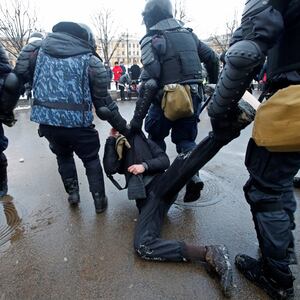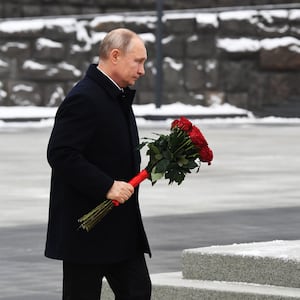MOSCOW—Vladimir Putin took a dark new turn towards authoritarianism on Wednesday when his regime began to imprison journalists who dared to report on the growing opposition protests.
A Moscow court ordered the jailing of one of the country’s leading independent journalists, Sergey Smirnov, editor-in-chief of Mediazona.
His supposed crime? Retweeting a joke on Twitter.
The post included the date of an upcoming rally in support of Alexei Navalny, an anti-corruption campaigner who was sentenced to almost three years in a penal colony on Tuesday for failing to meet his bail conditions while he was in a coma recovering from a Novichok attack.
Media freedom has long been an issue in Russia, and a number of journalists have died in suspicious circumstances. But even Putin has not previously resorted to openly arresting journalists without any pretense of justice.
“I am just shocked,” Smirnov’s wife, Tatiana, told The Daily Beast. “First police grabbed my husband in front of our little son’s eyes. Then the court ordered his arrest for reposting somebody’s joke.”
The court ruled that sharing the joke was effectively inciting people to join the “illegal” rally protesting Navalny’s arbitrary arrest.
“The accusation is ultimately absurd, my husband did not go to a single rally, he edited Mediazona from home,” she said.
For Russian independent journalists, who have seen dozens of ugly attacks on the press, Smirnov’s arrest was an alarming sign that Russia was entering a new era when it comes to freedom of speech. “This is a signal to all of us that tomorrow police can come and arrest editors-in-chief of the last three or four independent media outlets left in Russia, including Echo of Moscow, TV Rain, everybody who covers the power’s lawlessness,” Pavel Kanygin, a reporter at Novaya Gazeta, told The Daily Beast.
Six of Novaya Gazeta’s journalists have been murdered during the two decades of Putin’s rule. “The Kremlin has crossed one more red line. We did not have time to recover from the last shock and yet another wave of repressions crashes down,” Kanygin said.
Just in the past week of protests—the biggest in Russia in a decade—police violently beat up hundreds and detained more than 5,000 protesters participating in the anti-Putin rallies. More than 80 journalists have been detained in recent days. On Wednesday, the court ordered the arrest of young Novaya Gazeta reporter, Nikita Girin, who has been sentenced to 14 days in jail. Police detained several TV Rain journalists, who were streaming live video footage of opposition protests in Moscow, St. Petersburg, and other Russian cities. The channel’s popularity has significantly increased since Navalny landed in Moscow airport on Jan. 17. More than 23 million have watched the channel on YouTube.
Rain’s newsroom was buzzing on Wednesday afternoon: Journalists were covering dozens of arrests, where lawyers were not able to see their clients. News of another victim of political pressure came through; this time Russia’s best contemporary theater director, Kirill Serebrennikov, was fired from Gogol Center, the country’s leading avant-garde theater. A volunteer from Navalny’s Anti-Corruption Foundation complained on-air about being tortured by police. She said her interrogator put a plastic bag over her head on Tuesday to force her to share her cellphone password.
Amid this blizzard of news, the channel’s editor-in-chief, Tikhon Dzyadko, shook his head as he read the top stories published by state media. “To them, snow in Moscow is the top breaking news.”
Almost a decade ago, Russia’s free media, including the only independent channel TV Rain, covered an anti-Putin uprising–up to 100,000 protesters who came out to Bolotnaya square. But Russia was different back then, there was much more freedom under President Dmitry Medvedev. “In the beginning of the year, I hoped we would cover lots more lighter news, but political events develop too fast,” Dzyadko said. “This year is going to be newsy: The parliamentary parties will wake up now, before the upcoming elections.”
Although they are apparently trying to extinguish independent media, even the Russian authorities rely on the independent outlets as the only source of real information about political and public life. “When police detain our reporters in Moscow and St. Petersburg, they admit they watch Rain,” Dzyadko said.
Police also recognize journalists from the Echo of Moscow radio station. “Cops stand in chains and admit to us that they listen to our radio shows in the mornings, so in life they are people interested in political issues, of our coverage, but at work they detain us,” radio Echo of Moscow presenter Tania Felgengauer, a survivor of a stabbing attack, told The Daily Beast. “I guess many of Russian policemen have no choice, since there is no available job. As for the guys in the anti-extremism forces, who reported on Smirnov, they must have nothing human left.”








